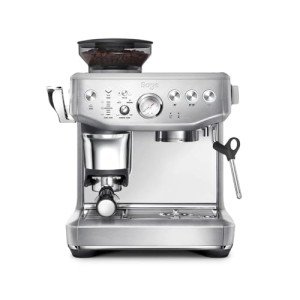The Rise of Home Espresso Machines: A Comprehensive Guide
As coffee fans continue to seek fresh and tasty brews in your home, the appeal of home espresso machines has surged recently. No longer simply the domain of coffee shops and coffee stores, these machines empower people to craft barista-quality espresso drinks from the comfort of their cooking areas. This short article will explore the various kinds of home espresso machines, their functions, and considerations for selecting the right one. Furthermore, it will provide a selection of FAQs to help prospective purchasers make informed choices.
Types of Home Espresso Machines
Home espresso machines can be categorized into numerous classifications based upon their systems and user-friendliness. Each type has its distinct features, pros, and cons.
| Type | Description | Pros | Cons |
|---|---|---|---|
| Manual Espresso Machines | Needs the user to manually control the brewing procedure, including techniques like pulling a lever to develop pressure. | - Complete control over brewing process - Compact style | - Requires skill and practice - Time-consuming |
| Semi-Automatic Machines | Machine automates water flow and pressure, however the user still manages the dosing and period of the brewing procedure. | - Balance of automation and control - Versatile | - Learning curve for refining strategies |
| Totally Automatic Machines | Automates the whole brewing procedure, from grinding to developing, typically with programmable settings for tailored drinks. | - Extremely user-friendly - Quick and convenient | - Less control over the brewing process - Higher cost point |
| Pill or Pod Machines | Utilizes pre-packaged espresso pills or pods to develop coffee quickly and easily. | - Extremely easy to use - Minimal clean-up | - Limited taste range - More costly per cup than ground coffee |
| Super-Automatic Machines | Integrates features of completely automatic machines with integrated grinders, allowing users to brew whole bean espresso and milk-based beverages with one touch. | - All-in-one benefit - Ideal for milk-based beverages | - Often the most expensive - Can be bulky |
Functions to Consider
When selecting a home espresso machine, possible buyers ought to consider the following functions to ensure they select a machine that fulfills their requirements:
Grinder Type:
- Built-in grinders can provide fresher premises but may need more upkeep.
- Different mills permit more modification of grind size.
Pressure:
- Look for machines that produce a minimum of nine bars of pressure, which is optimal for brewing espresso.
Water Temperature Control:
- Machines with adjustable temperature settings enable much better extraction of flavor from beans.
Milk Frothing Options:
- Consider whether you want a manual steam wand for frothing or an automatic milk frother for convenience.
Alleviate of Cleaning:
- Machines with detachable parts and self-cleaning functions significantly minimize clean-up time.
Size and Design:
- Ensure the machine fits comfortably in your kitchen and aligns with your visual choices.
Budget:
- Set a budget before starting your search, as prices can range considerably from affordable designs to high-end machines.
Benefits of Home Espresso Machines
Owning a home espresso machine offers many benefits:
- Cost-Effective: Over time, brewing espresso at home can save coffee lovers cash compared to frequent café sees.
- Modification: Users can experiment with various beans, grind sizes, and brewing techniques to find their perfect cup.
- Convenience: The ability to brew espresso at any time removes the requirement to go out to a coffee shop, especially beneficial during late nights or mornings.
- Quality assurance: With a home machine, individuals have total control over the quality of ingredients and developing processes.
Downsides of Home Espresso Machines
However, there are some disadvantages to think about:
- Initial Investment: High-quality espresso machines can be costly, requiring a substantial in advance financial investment.
- Knowing Curve: Mastering the art of espresso developing can take time and practice, which might be daunting for novices.
- Maintenance: Like any appliance, espresso machines require routine cleaning and maintenance to make sure optimal efficiency.
Frequently asked questions
1. What is the best kind of home espresso machine for newbies?
Response: For newbies, a semi-automatic machine is frequently advised as it provides a balance between control and automation, enabling you to learn the basics without frustrating complexity.
2. How Espresso Maker Online should I spend on a home espresso machine?
Response: Entry-level machines can begin around ₤ 100 to ₤ 300, while higher-end models can vary from ₤ 500 to over ₤ 2000. It's important to set a budget based on your anticipated use and preferred features.
3. Do I need a separate grinder?
Answer: While some espresso machines feature integrated grinders, investing in a separate grinder permits greater modification and ensures better quality premises.
4. How typically should Espresso Maker Online clean my espresso machine?
Answer: Cleaning frequency can differ by machine type, but it's typically recommended to clean the machine after each use and carry out deep cleansings weekly or monthly, depending on use.
5. Can I make milk-based beverages with any espresso machine?
Response: Not all machines come with milk frothing abilities. If you take pleasure in beverages like lattes or coffees, search for a machine with a steam wand or automatic frother.
Home espresso machines are transforming the way coffee fanatics enjoy their beloved brews. With see it here and advanced features available in the market, there is something for everyone. Whether it's the pleasure of creating special dishes or merely savoring the ideal shot of espresso, investing in a home espresso machine can boost both the coffee-drinking experience and the quality of life for coffee fans everywhere. Similar to any financial investment, it is essential to weigh the advantages versus the prospective disadvantages and pick a machine that seamlessly fits both your way of life and choices.

